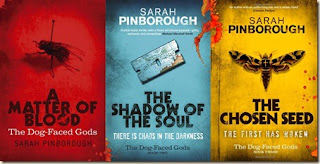Caroline Smailes lives in the North West of England. Her acclaimed debut novel, In Search of Adam, was
published in 2007 with The Big Issue
North declaring the book 'an engrossing and touching read from a new
talent'. Since then Caroline has written four additional novels. Her latest publication, is the stunning, The Drowning of Arthur Braxton.
1 - When
did you first, without hesitation, call yourself a writer?
That’s never happened.
2 - Are you a plotter or a pantster?
 I used to be a pantster. I’d ‘hear’ a voice and then
dive into the story. This meant I often started in the middle or at the end (and
never at the beginning). I wrote that way for my first 4 novels, and writing was
exciting but chaotic. It possibly reflected my life at that time. I wrote around
having preschool aged children and grabbed moments. Now, my kids are older and
I’m very much a plotter. I really and truly plan. I write a detailed synopsis
and character outlines before I begin. It takes away the spontaneity, but the
lack of chaos is refreshing.
I used to be a pantster. I’d ‘hear’ a voice and then
dive into the story. This meant I often started in the middle or at the end (and
never at the beginning). I wrote that way for my first 4 novels, and writing was
exciting but chaotic. It possibly reflected my life at that time. I wrote around
having preschool aged children and grabbed moments. Now, my kids are older and
I’m very much a plotter. I really and truly plan. I write a detailed synopsis
and character outlines before I begin. It takes away the spontaneity, but the
lack of chaos is refreshing.
3
- If you weren’t a writer,
what else could you see yourself doing?
I’d love to have an ice-cream van and travel the
country bringing ice-cream joy to rainy days. Also, I don’t like ice-cream, so
I’d not have to worry abut eating the profits. Or, I used to be an usherette
and that would be fun to do again. Or, failing both of those, I’d like to be an
elf.
 4 - Is there any
particular author or book that influenced you in any way either growing up or
as an adult?
4 - Is there any
particular author or book that influenced you in any way either growing up or
as an adult?
Roald Dahl. He wrote
what children wanted to read. He wasn’t frightened to kill off parents or to
address a child’s sense of loneliness and abandonment. He set new boundaries,
he mixed together sorrow and wit, and he cut through to the essence of what a
child finds funny. His stories are timeless.
5 - Do you have any kind of rituals you follow when
you write?
 At the moment I’m heading towards the end of a first
draft, so I write every morning. I don’t have any rituals for the act of
writing, but I always plan what I’m going to write the night before. This means
that when I sit down to write I don’t have any excuse but to dive right in.
At the moment I’m heading towards the end of a first
draft, so I write every morning. I don’t have any rituals for the act of
writing, but I always plan what I’m going to write the night before. This means
that when I sit down to write I don’t have any excuse but to dive right in.
6 - Music or silence when writing?
Neither. For my first four novels, my creative process
didn’t involve music. Children shouting, laughing, crying and even dogs barking
were all welcomed. But the minute I played any kind of music I became
distracted and kept singing along. Then when writing The Drowning of Arthur
Braxton music became part of how I wrote. Perhaps that’s because the book
was about music; it was a novel that had music at its very core. That hasn’t
happened since.
7 - If you
could travel back in time, when and where would you go?
Is this with or without
a DeLorean time machine and does Narnia exist?
8 - Do you have a favourite character from literature?
 Such a difficult question! I love Luna Lovegood. She
tends to like impossible things and I’d love to have been her friend. Or,
Matilda Wormwood. She’s clever and she’s brave and she’s full of courage. I
really could list so many more characters, but these are the two that jumped to
mind first.
Such a difficult question! I love Luna Lovegood. She
tends to like impossible things and I’d love to have been her friend. Or,
Matilda Wormwood. She’s clever and she’s brave and she’s full of courage. I
really could list so many more characters, but these are the two that jumped to
mind first.
9 - Coffee and Parkin or Tea and Biscuits?
Tea and biscuits (preferably large, ginger ones)
10 - What five words best describe your average day?
Spends too much time online.














